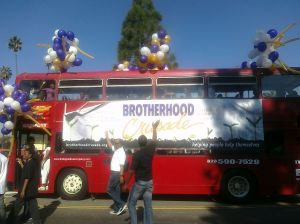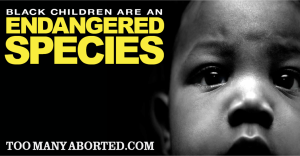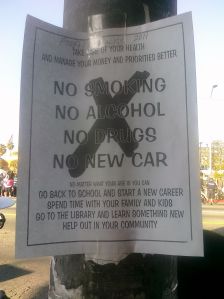I have only recently begun to appreciate the unique qualities of New York City. The multi-cultural make up of NYC is more prominent than in other major cities when you consider the amount of interaction between different ethnic communities (whether intentional or not). Yes, there are Dominican neighborhoods, Jewish areas and so forth, but at the end of the day almost all New Yorkers rub elbows on the subway and – in one clean snapshot – visibly make up a diverse and vibrant city. Not so in Los Angeles.
LA is a sprawling city and – from our experience here over the past two months – it takes 20-30 minutes to get anywhere (assuming no traffic). Each neighborhood is its own mini-city and residents of LA proper are hesitant to ever make the trek over the mountains to the Valley. Last week, realizing that Martin Luther King Day was around the corner, I began to look into local celebrations that we could attend. The official Los Angeles MLK Day Parade was set for Monday morning in Leimert Park and it seemed like the perfect opportunity to celebrate.
We invited a few different friends to join us. Most of them had work obligations and – when turning down the invitation – commented that we were venturing into the ‘hood. Yair and I only understood their remarks on Monday morning when we woke up, walked a few blocks to the start of the parade and realized that we were literally the only white people (cops excluded) at the event. Remember, this was the official MLK event of the city of Los Angeles and we were the only caucasian-looking people there. (At least this was true for the few blocks in either direction that our eyes reached.) I didn’t realize until this week how segregated many neighborhoods in Los Angeles are. Because everything is so spread out and the public transportation system is weak, there is very little interaction between different communities.
Let’s fast-forward to the main thrust of this post. These travels make up a period of exploration for me, meeting new people and seeing new places. To the extent possible, I try to put my upbringing and value system temporarily on hold when being introduced to new cultures in order to be open to what I see instead of judging it. What I saw on Monday in this 95% black neighborhood was as follows:
- A four-year-old girl grinding, thrusting her hips and shaking her imaginary chest while the women around her encouraged her with shouts of “work it!”
- A middle-aged woman remarking “look at that fat bitch” about an overweight parade marcher and subsequently cat-calling “you work that fat ass!” to the marcher as she danced down the street
- A few teenage boys ragging on a fourth teen about how he “missed the best time when we robbed that store last week!” Really.
My immediate reaction was somewhere between “something’s not right here” and “I’m glad that I didn’t grow up in this culture”. But then I checked myself and my own upbringing and tried to see the beauty and value in the culture. Perhaps it was very progressive that the women were encouraging even young girls to express their sexuality. Perhaps it was refreshing to see people candidly speak to one another about their appearance. Maybe “fat ass” was even meant as a compliment, akin to Jahlysa’s comments on her “thick” legs. And maybe the comments about robbing a store were the immature boasts of inventive teenagers. But I think not. I see serious issues with black “hip-hop culture” where I’ve been told by black friends that doing well in school means that you’re “acting white”. I can’t help but think if these are the characteristics that define black culture, is it a culture that earns my respect? Is that what these people are proud of? Certainly there are exceptions to this rule that are both individual and communal (e.g. church culture in the black community), but despite my initial discomfort with judging the behaviors of those surrounding me, I totally understand why many individuals don’t want certain cultures in their neighborhoods. Part of it could be racism, but perhaps a bigger part of it is value systems.
Parenthetically, Jimmy is a new friend of ours who coaches boot camp at the gym. Born and raised in rural Louisiana, he worked for the railroad and never left his home state until he was well out of his teens. The amount of racism still present in rural Louisana (and I imagine in other parts of the south) is absolutely horrendous and shocking. A brief example: When Jimmy was living in Louisiana about five years ago, he spotted a car broken down on the side of the road. The car was filled with black people and he told them that these aren’t friendly parts and it’s best to keep moving. When they explained that they weren’t going anywhere since the car was stuck, Jimmy told them that they needed to come back to his place and stay the night, else they might not survive until morning. And he wasn’t kidding. Apparently, people would have beat them up and much of the local police – born and educated in the town’s culture – would have looked the other way. That such racism and hatred is alive and well in this country is appalling.
I’m off to a quick Faces of Israel gig in Tucson later this morning before returning on Friday for our final two weeks in Los Angeles. The game plan involves beach time, a few live studio TV tapings, gymnastics, friends time and getting a final repair taken care of on the RV. I’ll be seeing some of you on the East Coast very soon!
posted by ayo





If you want to know some of the reasons neighborhoods got to be so segregated, read the Wikipedia page on Housing Segregation http://en.wikipedia.org/wiki/Housing_Segregation
Los Angeles was one of the cities where it was done a good deal. I forget the term they used in real estate for it, but there were restricted communities officially on the books well into 1968 or so, where black people could not buy in certain neighborhoods, no matter how much money they had.
Congratulations on exhibiting the courage to speak the truth as you see it, even though it isn’t “nice” to everyone. Of course the anti-education, anti-law, violence-prone, disease-prone, poverty-prone, anti-personal responsibilty culture is destructive–and, as it happens, mostly to its own members. But for the past 40 years it’s been taboo to mention the obvious. Slowly, slowly, that may be changing…or so I hope.
Racism, in its discrimination and cruelty, was terrible and irrational. It doesn’t follow that going to the other extreme, and insisting that all cultures are equally good, is either wise or sustainable. But most people, and most societies, tend to think in all-or-nothing ways, swinging from one extreme to another. Again, on this issue I hope that’s gradually changing, and that we can stand against discrimination, but also against simplistic, “everything is as good as everything else” thinking. And when an accepting person like you, who inclines toward celebrating other cultures, says what you said, that gives me cause for optimism.
I echo Michael – thank you for speaking up about this taboo subject. I would say someone is not a racist if they don’t think one race is superior to another.
But so many people are afraid of being labeled “racist” just because they disapprove of awfully bad behavior, such as you witnessed, and the people exhibiting that behavior usually happen to be non-white.
And they perpetuate their own stereotypes. There’s a reason a place is labeled as the ‘hood. Not because it’s low income, but because you walk there and hear catcalls and have a much higher likelihood of getting robbed…
My Wife and I have been to L.A. a couple times now this winter, and we seem to stick to the tourist type spots… so we don’t get the see “real life”… I sure wonder about it sometimes, and it seems you have found it!
Hi there – I’m sorry you are so quick to judge a gathering of tens of thousands on the actions of four people. That is called prejudice. Also you were not the only whites at the parade – after all I was there and I was standing near you two. We were dancing, celebrating and having a good time.
This is a sad bit of logic in the heart of your post: “I can’t help but think if these are the characteristics that define black culture, is it a culture that earns my respect? Is that what these people are proud of? Certainly there are exceptions to this rule that are both individual and communal (e.g. church culture in the black community), but despite my initial discomfort with judging the behaviors of those surrounding me, I totally understand why many individuals don’t want certain cultures in their neighborhoods.”
I definitely hope you don’t your RV in my neighborhood.
@enhager
I share Ayo’s feelings, and they are not based solely on the actions of four people. Those four were unfortunately just strong examples. For two years I took the subway twice daily in New York City and saw what’s more accurately called “hip-hop culture” in person. It certainly embodies values that I wouldn’t want my children to have.
I’m sorry that I didn’t see you near us at the parade, but what I think Ayo meant was that WE didn’t see a single white person at the event. How many did you notice?
It’s easy to call prejudice on us white folks when we criticize hip-hop culture, but how do you respond to Bill Cosby’s scathing criticisms of attitudes toward crime, education, respect, and parenting in the black community? Or President Obama’s bemoaning that black fathers have “abandoned their responsibilities, acting like boys instead of men.”
One of Ayo’s closest friends in Reno also happened to be her first real black friend. She was very proud of her black culture and history, but also constantly relayed stories of abuse and disrespect of women in her community.
Prominent black leaders have acknowledged that there is a problem out there, and it’s too bad that the color of our skin disallows us from expressing our disappointment with that culture as well.
The failings of contemporary black culture–low educational achievement, high violent crime rate, heavy majority of children born out of wedlock (with the economic and educational and behavioral problems this brings), high obesity rate, high STD rate, etc.–are not matters of debate. Sadly, they are objective facts.
Open for some debate is only the “whys” and “hows”–why it got this way, and how to improve things. But the longer so-called “friends” of the black community, or blacks themselves, insist against painfully obvious facts that contemporary American black culture is fine, the more blacks are hurt by the ongoing damaging influences of the culture and neighborhoods in which so many of them live.
Sometimes true compassion involves telling people what isn’t comfortable for them to hear–and sometimes defending people’s actions is the surest way to condemn them to a doomed path.
as someone who works in ~da hood,~ educatin’ the babies of the system, there’s definitely truth to what you say. but as you know, there is so much more than that. and believe me, there exist plenty of people in this community who yearn to change it from the inside, who work every day to educate their children, to educate themselves.
Some topical information that I recently read over at Marginal Revolution, a great economics blog:
“American schools are more segregated by race and class today than they were on the day Martin Luther King, Jr. was killed, 43 years ago. The average white child in America attends a school that is 77 percent white, and where just 32 percent of the student body lives in poverty.
The average black child attends a school that is 59 percent poor but only 29 percent white. The typical Latino kid is similarly segregated; his school is 57 percent poor and 27 percent white.
Overall, a third of all black and Latino children sit every day in classrooms that are 90 to 100 percent black and Latino.”
UPDATE: It looks like those data may be wrong / misleading.
@James: Thanks for the wiki article. I had no idea that so many practices in the real estate market were blatantly discriminatory through the late ’60s. It gives me a somewhat better sense of what led to segregation / isolation in the city of Los Angeles.
@Michael: I appreciate your supportive comment. I understand the ideas of moral relativism and that some values are subjective, but – perhaps like you – I believe that there are non-negotiables that are essential for any positive, productive society including respecting people and their property. What else makes it to the non-negotiable list is debatable and that’s where the gray area begins.
@frugalveganmom: Agreed. No one wants to be called racist or sexist, and so those are words used to stop conversations. Yair and I used to joke around that there should be a word called “Trereotypes”, as in true stereotypes. Stereotypes may reflect ignorance and promote falsehoods about cultures, but they may also occasionally have a large measure of truth in them! For example, the stereotype about immigrants from Japan doing exceptionally well and being dedicated in school is often true because the culture places value on discipline and education. So, that would be a trereotype. Sorry if that sounds too silly. 🙂
@John: Let us know if / when you find your way to LA again and we’ll make a caravan into the real city together. Or, as Yair would say, our RVs can have a playdate.
@enhager: Eddie, I am sorry that I upset you as that was never my intention. I am a fairly open-minded person and try to check myself whenever feeling the impulse to judge someone or something. As Yair responded, my observations were not solely based on the actions of four people – those were only examples. Perhaps the observation that I made was premature, but then – instead of telling me that you hope not to see my RVin your neighborhood – tell me what specifically you felt was so off-base and share with me what you so value about the neighborhood, as I’m all ears. It’s rare that you can write someone off entirely and have them come back to you and say “teach me”.
@Yair: Hi sweetie. I love you.
@Michael: I’ve heard so much about the “whys” (it got this way) and am interested in learning more about the “hows” (to improve it). Let me know if you have any recommended reading on this one.
@Adi: It’s unique in our circles (not entirely sure how I’d define that, but let’s just say people raised religiously Jewish) that you get an inside look at this community. You’re right that the triumphs should be celebrated and I don’t doubt that there are people who want to change things from the inside. I’d like to hear more about this and about your experiences. Care to share on the blog and – if not – perhaps as a Skype date?
One of the wonderful things that I learned driving a schoolbus for six years in Berkeley, California in a black/latino/white environment regards the different ways that different cultures tend to view the spoken word.
If you compare “white” and “black” culture, “white” people tend to regard the spoken word as very important indeed. There is alot of attention given to “keeping your word”; “saying what you mean”; being a “man/woman of your word” and this sort of thing.
Yeah, “white” people take things that are said,(and not said) very seriously. Some of the utterances that one might hear at an MLK Day parade probably seem egregious indeed to someone who takes the spoken word very seriously.
Not all cultures take the spoken word as seriously as “white” culture. Not all cultures are so hung up on being verbal or oral or aural or whatever it is. Some cultures might, for example, be kinethetically oriented or might care less about what is said than about what is done, (actions).
I remember the point at which I began to realize that “people sayin’ shit is just people sayin’ shit”, (ie, the spoken word may not be as meaningful or substantive as “white” people seem to believe). (In fact, the words we concoct and say or write may be quite a bit less important than I formerly believed). I had just read “Mutant Message From Down Under” and the aborgines in the book said that speech itself is a misuse of the sacred, ie, it is sacriligious. They believe that the human voice is meant for singing; grieving and speaking with the creator, not for frivolous use like asking someone to pass the ketchup.
I recall the American Indian sentiment, “white man speak with forked tongue”, and I realize that though white people take the spoken word very seriously indeed, paradoxically they dishonor it and misuse it just as often as any other culture.
Pardon the disjointed rambling……in those six years of driving that bus in that time and that place, I heard so many words that I thought mattered so much, but of course, most of those words hardly mattered a bit…..it was just people sayin’ shit……not to be given overly much attention or creedence…..kind of like the essence of the blogosphere……….
Nowadays, I pay less attention to words and more attention to the energy between and amongst people. Try imagining for a moment that you are deaf and mute, and cannot read lips. A wordless world, if you will. Imagine that the data that you had to go by was what people did and what occurred when you stood in their presence. Would your moment be any less rich or less informed. I don’t believe so.
Yeah, we love our words, but of course, they are also quite meaningless….
Allan, very intriguing perspective. Thanks.
Allan, thanks for your perspective. I never considered that cultures as a whole might value speech differently. Like you, I believe that actions trump speech and that doing something is more important than talking about it (walking the walk vs. talking the talk).
At the same time, my culture (Orthodox Jewish) places a tremendous value on how we use our language – for the good or the bad. There is an emphasis on not speaking badly about anyone, as you can’t take back the hurt that is spread and language was given to us in order to sanctify this world and not to make it more base.
If you’re interested, the following Jewish parable (one of my favorites) illustrates my point. Let me know if you have a chance to read it.
http://www.chabad.org/library/article_cdo/aid/812861/jewish/A-Pillow-Full-of-Feathers.htm
whoa, deep. You should put up some sort of warning for people who aren’t ready for heavy thought. I’ll stick to reading the hair posts for the time being.
Sorry? I think that our posts roughly break down as follows:
75%
-I climbed a mountain today!
-Look at this interesting person we met!
-Check out a new gadget we found!
25%
-Reflections, Observations and “Warning! This Will Make You Think”
I’ll try to give you some advanced notice next time. 😉
I HAVE BEEN LIVING IN THE CRENSHAW HOOD SINCE 1962 BEFORE THE DAM BROKE AND THE WATS RIOT HAPPEN I GROW UP IN VIEW PARK (did you see the homes in the hills) WELL BELIEVE IT OR NOT THIS IS NOT THE HOOD THIS IS WEST LA CALIFORNIA THE OTHER WEST LA CALLS IT THE HOOD SO WHITE FOLKS WONT GO TO THE QUOTE UNQUOTE WRONG SPOT IN TOWN BUT IF YOU READ YOUR HISTORY THIS WHOLE AREA WAS ONCE ALL JEWISH AFTER PROFESSORIAL BLACK PEOPLE (DOCTORS, LAWYERS,TEACHERS,COLLAGE PROFESSORS LIKE MY PARENTS AND MY SELF) AND I LIVE AND GO TO HOOD EVERYDAY AND GUESS WHAT IT THERE IS LESS RACISM HERE THEN IN WHITE WEST LA , BVERLY HILLS,THE VALLEY,DOWNTOWN LA OR WERE EVER THERE IS WHITE AND OTHERS THEN BLACK PEOPLE SO BLACK PEOPLE DO WHAT THEY DID BEFORE THE 60’s-50’s MAKE WHAT WAS GIVEN TO THEM THE BEST THAT THEY CAN MAKE IT AND IF YOU DO NOT SEE THE BEAUTY IN WHAT YOU SAW THAT DAY YOU WILL NEVER SEE IN ANYTHING IN LIFE 9OH BY THE WAY I WAS STANDING IN THE SAME SPOT THAT YOU WERE AND I SAW THE BEAUTY WHAT DID YOU SEE TRY TO SEE LIFE LIKE GOD SEE LIFE HE MADE EVERYTHING BEAUTIFUL ONLY MEN AND WOMEN MAKE LIFE UGLY NOT GOD SO TRY TO DO YOUR PART IN THIS LIFE BY TRYING TO SEE THE BEAUTY IN EVERYTHING AND EVERYPLACE YOU GO AND YOU WILL SEE GODS PLAN FOR MAN PLEASE DO NOT BLOCK YOURSELF FROM THE SUNLIGHT OF THE SPIRIT OF GOD SO LETS WHAT YOU SEE NEXT YEAR THANK YOU oliver1956
Oliver, thanks for your comments and your blessing. I do hope that what you say is true and that there is less racism in your community than elsewhere. Perhaps this is something that other communities can learn from,
Oliver, thanks for your comments and your blessing. I do hope that what you say is true and that there is less racism in your community than elsewhere. Perhaps this is something that other communities can learn from.